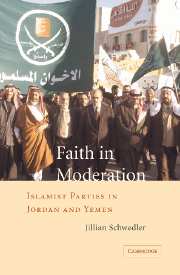Book contents
- Frontmatter
- Contents
- List of Figures
- List of Tables
- Preface
- Acknowledgments
- List of Abbreviations
- Note on Transliterations and Translations
- Faith in Moderation
- 1 Moderation and the Dynamics of Political Change
- 2 Political Liberalization as a Mechanism of Control
- 3 Public Political Space
- 4 Cultural Dimensions of Political Contestation
- 5 Justification and Moderation
- 6 Conclusion: Does Inclusion Lead to Moderation?
- References
- Index
1 - Moderation and the Dynamics of Political Change
Published online by Cambridge University Press: 18 December 2009
- Frontmatter
- Contents
- List of Figures
- List of Tables
- Preface
- Acknowledgments
- List of Abbreviations
- Note on Transliterations and Translations
- Faith in Moderation
- 1 Moderation and the Dynamics of Political Change
- 2 Political Liberalization as a Mechanism of Control
- 3 Public Political Space
- 4 Cultural Dimensions of Political Contestation
- 5 Justification and Moderation
- 6 Conclusion: Does Inclusion Lead to Moderation?
- References
- Index
Summary
Do Islamist political parties threaten emerging democratic processes? According to some, these groups are uncommitted to democratic norms and seek to exploit electoral processes to achieve nondemocratic ends. Others argue that the inclusion of Islamists is necessary because they represent a significant segment of their societies and because excluding them is a surefire means of promoting radicalism rather than encouraging moderation. Embedded in this latter argument is the idea that those who are included will become more moderate and tolerant as they learn to engage in democratic processes. Theoretically, we know surprisingly little about how this process might actually unfold. On a practical level, the stakes of getting political inclusion right – of deciding whom to include and whom to exclude – are extraordinarily high, particularly when pluralist institutions and practices are not yet well established.
Yet the relationship between inclusion and moderation is more complicated than typically portrayed, and two distinct propositions – that exclusion increases radicalism, and inclusion increases moderation – are frequently conflated. Inclusion and exclusion are often posited as a continuum, with moderation greatest in democratic, pluralist, and politically inclusive societies, and radicalism greatest in exclusive, repressive, and authoritarian societies. If increased inclusion means decreased radicalism, then inclusion is certainly preferable on both normative and practical grounds. But are these relations as strong as they are assumed to be? Even more, are the implied causal mechanisms for moderation and radicalization well established on their own, let alone as producing consistent effects with movement along a continuum?
- Type
- Chapter
- Information
- Faith in ModerationIslamist Parties in Jordan and Yemen, pp. 1 - 33Publisher: Cambridge University PressPrint publication year: 2006



